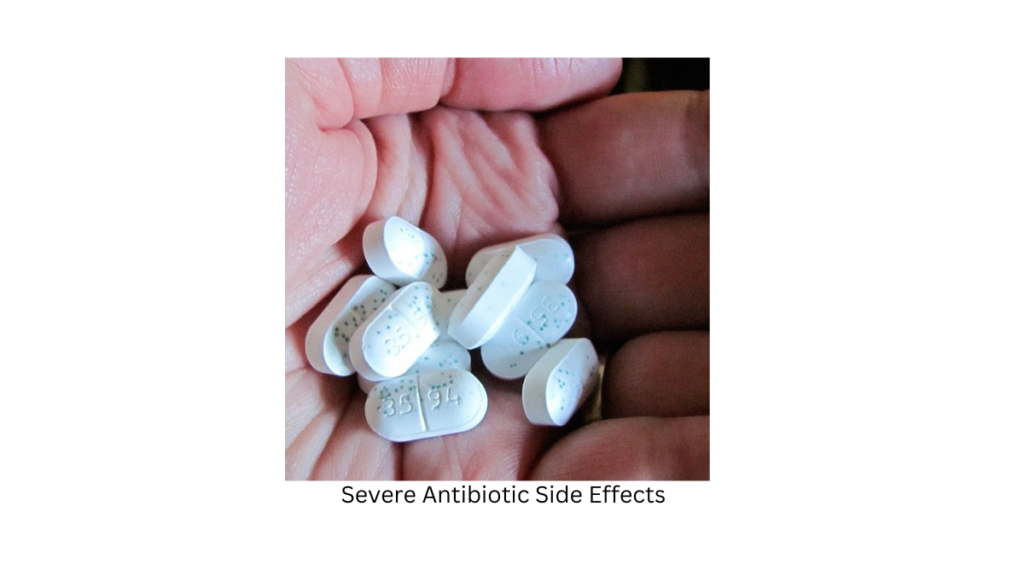Introduction:-
A Deep Dive into Severe Antibiotic Side Effects and Prevention

Antibiotics are essential medications used to combat bacterial infections, but like any medical intervention, they can have side effects. While most side effects are mild and temporary, some can be severe and require immediate attention. In this article, we’ll take a comprehensive look at the more serious side effects of antibiotics, as well as effective strategies to prevent them.
Understanding Severe Antibiotic Side Effects

- Clostridium difficile Infections (CDI): Antibiotics can disrupt the balance of bacteria in the gut, leading to an overgrowth of harmful bacteria like Clostridium difficile. CDI causes symptoms ranging from mild diarrhea to life-threatening inflammation of the colon.
- Allergic Reactions: Some individuals may develop allergic reactions to antibiotics, leading to symptoms such as skin rashes, itching, swelling, and in severe cases, anaphylaxis, a life-threatening condition that requires immediate medical attention.
- Serious Skin Reactions: Certain antibiotics can cause severe skin reactions like Stevens-Johnson syndrome and toxic epidermal necrolysis. These conditions cause blistering, peeling, and sloughing of the skin and may require hospitalization.
- Liver and Kidney Damage: In rare cases, antibiotics can cause liver or kidney damage. Symptoms include jaundice, dark urine, abdominal pain, and changes in urination patterns.
- Nerve Damage: Antibiotics like fluoroquinolones have been associated with nerve damage, leading to symptoms such as pain, tingling, numbness, and weakness. Peripheral neuropathy can sometimes become permanent.
Prevention Strategies for Severe Antibiotic Side Effects

- Consult a Healthcare Professional: Always consult a healthcare provider before starting antibiotics. They can recommend the appropriate antibiotic for your condition, taking into account factors like allergies and potential interactions with other medications.
- Provide Full Medical History: Inform your doctor about your medical history, including allergies and any existing health conditions. This information helps them choose the safest and most effective antibiotic for you.
- Follow Prescribed Dosages: Take antibiotics exactly as prescribed by your doctor. Skipping doses or stopping treatment prematurely can lead to antibiotic resistance and increase the risk of severe side effects.
- Monitor for Allergic Reactions: Be vigilant for allergic reactions while taking antibiotics. If you experience symptoms like rash, swelling, difficulty breathing, or rapid heartbeat, seek medical help immediately.
- Stay Hydrated: Drinking plenty of water can help prevent kidney damage associated with certain antibiotics. Adequate hydration also helps flush out toxins from your body.
- Consume Probiotics: Since antibiotics can disrupt the gut microbiota, consuming probiotics (live beneficial bacteria) can help maintain a healthy balance. Yogurt, kefir, and fermented foods are good sources.
- Report Unusual Symptoms: If you experience any unexpected symptoms while taking antibiotics, contact your healthcare provider. Early intervention can prevent potential complications.
- Avoid Alcohol: Some antibiotics can interact with alcohol, leading to adverse reactions. Check with your doctor about alcohol consumption while on medication.
- Educate Yourself: Learn about the specific antibiotic you’re prescribed. Understand its potential side effects and interactions to better monitor your health.
- Finish the Full Course: Even if you start feeling better, complete the full course of antibiotics as prescribed. Incomplete treatment can lead to antibiotic resistance and recurring infections.
What other medicines can we take to avoid serious antibiotic side-effects?
While there isn’t a specific medicine that universally prevents all antibiotic side effects, there are several approaches and complementary treatments that can help mitigate the risk of certain adverse reactions caused by antibiotics. Keep in mind that it’s important to consult with a healthcare professional before taking any additional medications or supplements, as interactions and individual health conditions can vary. Here are some general suggestions:

- Probiotics: Taking probiotics, which are live beneficial bacteria, can help maintain a healthy balance of gut microbiota. Antibiotics can disrupt the natural bacterial balance in the gut, potentially leading to digestive issues like diarrhea. Probiotics such as yogurt, kefir, sauerkraut, and supplements containing Lactobacillus or Bifidobacterium strains may help prevent antibiotic-associated diarrhea.
- Antihistamines: If you’ve experienced mild allergic reactions to antibiotics in the past, your doctor might recommend over-the-counter antihistamines like cetirizine or loratadine to help manage symptoms like itching and skin rashes. However, severe allergic reactions require immediate medical attention and may need more than antihistamines.
- Topical Treatments: For localized skin reactions like rashes or itching, topical treatments such as hydrocortisone creams can provide relief. Consult a healthcare professional before using any topical medication.
- Pain Relievers: Over-the-counter pain relievers like acetaminophen or ibuprofen may help manage mild discomfort associated with certain antibiotic side effects, such as headaches or muscle aches. Be cautious and follow recommended dosages.
- Anti-Inflammatory Drugs: In cases where antibiotics cause inflammation, non-steroidal anti-inflammatory drugs (NSAIDs) like ibuprofen might help reduce pain and swelling. However, NSAIDs can interact with some antibiotics, so it’s essential to consult your doctor.
- Corticosteroids: In some instances, corticosteroid creams or ointments may be prescribed to manage skin reactions like rash or inflammation caused by antibiotics. These should be used under medical supervision due to potential side effects.
- Fluids and Electrolytes: To prevent dehydration, which can sometimes occur with antibiotic use, it’s essential to stay well-hydrated. Drinking plenty of water and consuming electrolyte-rich beverages can help maintain proper hydration levels.
- Vitamin Supplements: In consultation with a healthcare provider, certain vitamin supplements might be recommended to support your immune system during antibiotic treatment. However, excessive use of supplements can lead to adverse effects, so moderation is key.
- Personalized Recommendations: Depending on your medical history, allergies, and the specific antibiotic you’re taking, your healthcare provider might suggest specific treatments to address potential side effects.
It’s crucial to remember that while these approaches may help alleviate certain antibiotic side effects, they might not completely eliminate the risk of all adverse reactions. Communication with your healthcare provider is vital for proper guidance and monitoring throughout your antibiotic treatment. Always inform your doctor about any additional medications, supplements, or remedies you plan to use to ensure they are safe and appropriate for your individual situation.
Conclusion
While antibiotics play a vital role in treating bacterial infections, it’s crucial to be aware of potential severe side effects. By staying informed, following medical advice, and practicing preventive strategies, you can minimize the risk of these adverse reactions. Remember, communication with your healthcare provider is key to a safe and successful antibiotic treatment. If you experience any unusual symptoms or side effects, don’t hesitate to seek medical assistance promptly.





